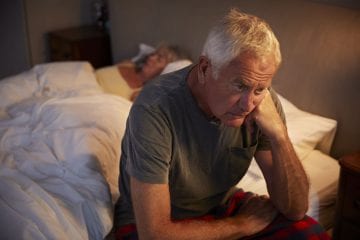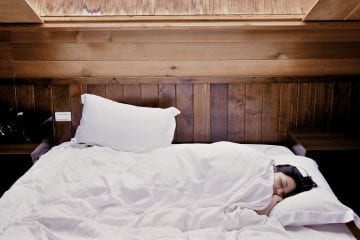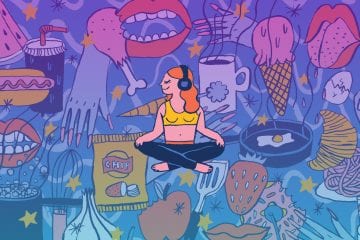How is sleep affected by ageing?
As we get older, it is normal to experience changes in sleeping patterns. Getting sleepy earlier in the day, waking up earlier in the morning, or having a lighter sleep are all normal things common in older people.
What is not a normal part of the ageing process, however, is having a disturbed sleep, waking up feeling exhausted every day, or any of the other symptoms associated with insomnia. Sleep is as important when you are older as it was when you were young, both for your physical and emotional wellbeing and overall health.
Getting a decent night’s sleep will help you improve concentration and memory. It also helps your body to repair any cell damage that it endured during the day and refreshes your immune system which protects you from disease.
It is more common for older people to suffer from depression if they don't sleep well. The same can be said for memory and attention issues, excessive sleepiness during the day, and the risk of trips or falls at night. Even more serious is the increased risk of diabetes, weight issues, cardiovascular diseases, and breast cancer.
Understanding the underlying causes of your poor sleeping patterns will help you start to improve the quality of your sleep. Incorporating these tips into your routine will help you overcome sleeping issues associated with ageing and improve the quality of your life.
Table of Contents
How much sleep do you need as you get older?
Everyone's requirements are different, but most people need between 7.5 and 9 hours of sleep every night. It is not the number of hours, however, that is the important factor. What matters the most is how rested you feel in the morning. Regardless of the number of hours of sleep you are getting, waking up tired and being tired throughout the day are signs that you're not getting enough sleep.
Sleeping Tips
1. Understand how ageing affects your sleep.
As you get older your body slows down production of the growth hormone. This is likely to show as a decreased amount of deep or slow-wave sleep which is one of the most refreshing stages of the sleep cycle.
Less growth hormone means that less melatonin is produced, which results in more fragmented sleep. This is one of the reasons why people consider themselves to be light sleepers as they get older.
Other sleep related occurrences are:
- Wanting to sleep earlier and wake up earlier
- Having to spend more time in bed to get the required amount of sleep
- Increased napping to make up for missed sleep.
For the majority of people these changes to sleep patterns are normal and are not associated with any sleep problems.
There are also some sleep problems that are not related to your age.
Experiencing sleep problems at any age can be common. However, regularly experiencing any of the following symptoms could mean that you are dealing with a sleep disorder:
- Having difficulty getting to sleep even when you're tired
- Having difficulty getting back to sleep when awoken at night
- Not feeling refreshed after a night's sleep
- Feeling sleepy or irritable during the day
- Difficulty staying awake while driving, watching TV, or simply sitting still
- Finding it difficult to concentrate during the day
- Relying on drugs, alcohol, or sleep medications to get to sleep
- Having difficulty controlling emotions.
2. Figure out what the underlying problems are.
In many instances insomnia or other sleep problems can be sorted out by dealing with the underlying problems. Identifying them will allow you to treat them accordingly.
Consider these things:
- Are you suffering from stress?
- Are you feeling depressed?
- Do you feel hopeless?
- Are you experiencing anxiety?
- Is there something that is causing you to worry?
- Have you suffered recent trauma?
- Are you taking any medications?
- Do you have ongoing health problems?
Causes of insomnia and sleep issues experienced by older adults
- Poor sleeping habits. Sleeping hours should be kept regular. People should not consume alcohol before sleep. Watching TV or using electronic devices should cease before tiredness sets in.
- Poor sleeping environment. The bedroom should be comfortable, quiet, and have the lights dimmed or darkness.
- Medical conditions and associated pain. Health conditions including arthritis, asthma, diabetes, heartburn, osteoporosis, urinary infection, and Alzheimer’s disease can cause sleep problems. You should consult your doctor if you experience any of these medical issues or others that may be affecting your sleep.
- Menopause and beyond. Many women experience hot flushes and night sweats during menopause which can interrupt their sleep. Even after menopause they can continue to have sleep problems. Improvements to daytime habits such as a better diet and exercise regime can help.
- Medications. Elderly people tend to take more drugs and medications than the young. Combinations of medications and their side effects can make sleep difficult. You should consult your doctor if you wish to make changes to your medications to help improve your sleep.
- Lack of or limited exercise. Having a lifestyle that is too sedentary may mean that you don’t feel sleepy enough to get a good night’s sleep. Regular exercise during the day can help you sleep well.
- Stress. Stress can be caused by many things: retirement, the death of a friend or family member, moving into a care home, or being hospitalized. There is nothing better to relieve stress than finding someone with whom you can be face-to-face.
- Lack of socializing. As people age, their opportunities for socializing very often reduce. A lack of social interaction can lead to stress. Volunteering, doing some work, or interacting with friends and family will increase activity levels, thus preparing your body for a good night’s sleep. Try getting involved in a group activity or enrolling in an educational course.
- Sleep disorders. As you get older, sleep disorders such as the restless legs syndrome (RLS), snoring, or sleep apnea are more common.
- Lack of sunlight. Exposure to sunlight will help regulate melatonin levels and your cycles of sleep and being awake. A minimum of two hours of sunlight per day is recommended. Leave curtains or shades open during the day and consider using a light therapy box.
3. Improve your sleeping habits
Many cases of insomnia or sleep disorder can be addressed by making improvements to the sleeping environment and by improving sleeping habits. But what do good habits look like? Everyone is different, so a certain amount of experimentation may be needed to discover exactly what changes need to take place. Some generic good habits include:
- Boost your melatonin levels without using drugs or medications. Using artificial lights at night can reduce your body’s ability to produce melatonin, a hormone that induces sleep. Alternate sources of light include low-wattage bulbs.
- Switch off the TV and electronic devices at least one hour before bedtime.
- When reading at night, do not use a device with a backlit screen such as an iPad. If you are using an electronic device for reading, use one that requires an additional light source, such as an e-reader.
- Keep your bedroom quiet, dark, and not too warm, and make your bed comfortable. Keeping noise, light, and heat to the minimum can also reduce sleep problems. Using a sound machine, ear plugs, or a sleep mask can help you create a better sleeping environment.
- Keep the bedroom solely for sleeping and intimacy. Watching TV or using the computer should be done elsewhere. This way your brain will associate the bedroom only with sleep (and intimacy).
- Move any clocks in the bedroom out of view. This is for two reasons: the light from the digital display can disrupt your sleep, and watching the minutes pass can create stress or anxiety about not being able to sleep.
If you want to get a good night’s sleep, maintain a regular bedtime routine
Keep to the same sleep schedule. Go to bed and wake up at the same times every day, including weekends.
Block out the sound of snoring. If snoring is preventing you from sleeping, try using earplugs or a white noise machine. If your partner’s snoring is the problem, you may have to consider sleeping in separate bedrooms.
Go to bed when you're tired. Adjust your bedtime so that you go to bed when you feel tired, even if that’s earlier than normal.
Establish relaxing bedtime routines. A soothing bath, listening to gentle music, practicing meditation, or relaxation techniques will all help you relax before bedtime.
Reduce the amount of sleeping aids or pills you take. Many sleeping aids have side effects that can negatively affect your sleep. These things are generally only meant to be used in the short term. Sleep medications do not address the cause of your sleep problems and can do more harm over time.
Combine sex and bedtime. Physical intimacy and sex can bring you deep and restful sleep.
How to take a nap
If you are feeling less than fully alert during the day, having a nap can provide you with the energy needed to function for the rest of the day. Some cultures, such as the Mediterranean countries and the Japanese, have naps built into their days. Give a nap a try and follow these tips:
- Keep them short. Napping for just 5 minutes will make you more alert and can improve memory. Naps should be restricted to 15-45 minutes as after this time you may feel groggy.
- Take a nap early. Take a nap in the early afternoon, maybe just after lunch. Napping later in the day may disrupt your bedtime routine.
- Nap comfortably. Try to make yourself comfortable when you take a nap. Minimize noise, light, and other distractions.
4. Improve your sleep through a change in diet and exercise routines.
The two biggest daytime habits that influence the quality of your sleep are diet and exercise. As key as your daytime diet is, the quality and quantity of food that you eat before going to bed is just as important.
Dietary tips to improve the quality of your sleep
- Limit caffeine consumption later in the day and before bedtime. Consider avoiding drinks containing caffeine such as coffee, tea, soda, and hot chocolate later in the day.
- Avoid drinking alcohol before bedtime. You might think that alcohol will make you sleepy, but the opposite is the case, and it will disrupt your sleep.
- Don’t go to bed hungry. A light snack such as low-sugar cereal, yogurt, or even a drink of warm milk will stop you from waking up to hunger pangs.
- Reduce intake of sugary foods. Diets that are high in sugar and refined carbs such as white rice, white pasta, and potatoes can cause restless nights where you lose out on key restorative stages of sleep.
- Avoid large or spicy meals just before sleeping. Spicy or large meals just before bedtime may lead to indigestion or discomfort and ruin your sleep. Eat modestly at least 3 hours before you go to bed.
- Don’t drink too much before sleeping. Limiting the amount you drink before sleep will limit the number of times you wake up to use the bathroom at night.
Exercising for a good night’s sleep
Exercising, and in particular doing some aerobic exercise, will release chemicals that help you get a more restful sleep. Even for people with mobility issues there are plenty of physical activities that can be done to promote good sleep. Always consult your doctor before undergoing any new strenuous activity.
Give some of these a try:
- Swimming. Swimming the lengths of a pool is a low-impact way to build up fitness. It will also help with sore joints and build muscles. Many public, community, and YMCA swimming pools have programs for older adults. There are also other water-based exercise classes available to try.
- Dancing. Dancing is a great way to extend your social network while you get some quality exercise.
- Lawn bowling. This game provides you with a gentle means of exercise. Walking more and faster will increase your overall fitness.
- Playing golf. Golf will give you the opportunity to get out for a good walk while you play, even if you are not that skilled at it. In fact the less skilled you are, the more distance you will cover! It is a very sociable game with plenty of opportunities to chat during the round.
- Running or cycling. If you are in good physical shape, you can keep running and cycling until late in life. Both these exercises can be done outdoors or indoors on a treadmill or stationary bike.
Doing aerobic exercise will help an older adult to sleep better.
Research conducted at the Northwestern University concluded that aerobic exercise results in the most significant improvement in the quality and duration of sleep for older adults diagnosed with insomnia. Key aspects of the research were:
- Subjects exercised for either two 20-minute or one one 40-minute session four times per week.
- The work rate was 75% of the maximal heart rate.
- Exercise included walking or using a treadmill or stationary bicycle.
- Overall sleep quality improved from the starting categorization as poor sleeper to recategorizing as good sleeper by the end of the program.
- Subjects reported less depression, more vitality, and less sleepiness during the day.
5. Reduce stress.
Stress, tension, and anxiety that builds up throughout the day can have an adverse effect on sleep. Learning how to release any worrying thoughts at bedtime will aid good sleep. Try doing these activities to help:
- Keep a journal and make a note of any worries or concerns that you have before you go to bed.
- Make a to do list. Check off the tasks you’ve completed that day and list goals for the next day. Once listed, let them go.
- Listen to some relaxing and calming music.
- Read a book that makes you feel good or relaxed.
- Receive a massage from a friend or partner.
- Employ a relaxation technique to get your body ready for sleep.
- Speak to someone during the day about what causes you to worry.
Getting back to sleep after waking up at night
As we age it is perfectly normal to wake up frequently during the night. However, if falling asleep again is difficult, you may benefit from the following tips:
- Don’t stress about it. Stressing about not being able to get back to sleep will only mean that you cannot get back to sleep. Try to focus on your body and how it feels rather than thoughts about sleep.
- Focus on relaxation rather than sleep. Using a relaxation technique such as deep breathing or meditation while you are in bed will help you relax and take your mind off sleep. It will not replace sleep, but relaxation can assist in rejuvenating your body.
- Try some quiet, not stimulating activities. If you have been lying awake for over 20 minutes or so, get out of bed and do some not stimulating activity. Reading a book is a good one, but make it an actual book, and really avoid screens.
- Put off worrying. It is often anxiety that keeps you awake during the night. If so, make a brief note of your concern in a notebook and put off worries until you are in a position to do something about them.
When should you consult your doctor about sleep problems?
If you have attempted to resolve your sleep problems without success, you might want to consult your doctor. Start keeping a sleep journal so that you can detail the problem to them. Record when you consume alcohol, caffeine, nicotine, and any medications. Include your exercise routines, any recent lifestyle changes you have made, and anything that is causing you stress. You may be referred to a sleep specialist or cognitive behavioral professional, particularly if your health is being affected.
Therapy or sleeping pills to help aid insomnia?
Sleeping pills and aids can be an effective solution for insomnia when they are used sparingly and for short periods. One such example would be during recovery from surgery or a medical procedure. They will not be a cure for your insomnia in the long term and, in fact, can often make your insomnia worse if taken for extended periods.
Cognitive behavioral therapy (CBT) is used to treat sleep conditions by addressing negative thoughts and behaviors that deny you a good night’s sleep. A Harvard Medical School study found that CBT treated chronic insomnia more effectively than sleep medications. It also comes without the risks or side effects of these drugs. CBT can be conducted on your own, in a group, or even online.



